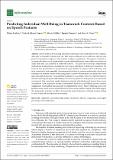| dc.contributor.author | Zeulner, Tobias | |
| dc.contributor.author | Hagerer, Gerhard Johann | |
| dc.contributor.author | Müller, Moritz | |
| dc.contributor.author | Vazquez, Ignacio | |
| dc.contributor.author | Gloor, Peter A. | |
| dc.date.accessioned | 2024-04-26T13:36:29Z | |
| dc.date.available | 2024-04-26T13:36:29Z | |
| dc.date.issued | 2024-04-12 | |
| dc.identifier.issn | 2078-2489 | |
| dc.identifier.uri | https://hdl.handle.net/1721.1/154293 | |
| dc.description.abstract | Current methods for assessing individual well-being in team collaboration at the workplace often rely on manually collected surveys. This limits continuous real-world data collection and proactive measures to improve team member workplace satisfaction. We propose a method to automatically derive social signals related to individual well-being in team collaboration from raw audio and video data collected in teamwork contexts. The goal was to develop computational methods and measurements to facilitate the mirroring of individuals’ well-being to themselves. We focus on how speech behavior is perceived by team members to improve their well-being. Our main contribution is the assembly of an integrated toolchain to perform multi-modal extraction of robust speech features in noisy field settings and to explore which features are predictors of self-reported satisfaction scores. We applied the toolchain to a case study, where we collected videos of 20 teams with 56 participants collaborating over a four-day period in a team project in an educational environment. Our audiovisual speaker diarization extracted individual speech features from a noisy environment. As the dependent variable, team members filled out a daily PERMA (positive emotion, engagement, relationships, meaning, and accomplishment) survey. These well-being scores were predicted using speech features extracted from the videos using machine learning. The results suggest that the proposed toolchain was able to automatically predict individual well-being in teams, leading to better teamwork and happier team members. | en_US |
| dc.publisher | MDPI AG | en_US |
| dc.relation.isversionof | 10.3390/info15040217 | en_US |
| dc.rights | Creative Commons Attribution | en_US |
| dc.rights.uri | https://creativecommons.org/licenses/by/4.0/ | en_US |
| dc.source | Multidisciplinary Digital Publishing Institute | en_US |
| dc.title | Predicting Individual Well-Being in Teamwork Contexts Based on Speech Features | en_US |
| dc.type | Article | en_US |
| dc.identifier.citation | Zeulner, T.; Hagerer, G.J.; Müller, M.; Vazquez, I.; Gloor, P.A. Predicting Individual Well-Being in Teamwork Contexts Based on Speech Features. Information 2024, 15, 217. | en_US |
| dc.contributor.department | System Design and Management Program. | |
| dc.contributor.department | Massachusetts Institute of Technology. Center for Collective Intelligence | |
| dc.relation.journal | Information | en_US |
| dc.identifier.mitlicense | PUBLISHER_CC | |
| dc.eprint.version | Final published version | en_US |
| dc.type.uri | http://purl.org/eprint/type/JournalArticle | en_US |
| eprint.status | http://purl.org/eprint/status/PeerReviewed | en_US |
| dc.date.updated | 2024-04-26T13:09:06Z | |
| dspace.date.submission | 2024-04-26T13:09:06Z | |
| mit.journal.volume | 15 | en_US |
| mit.journal.issue | 4 | en_US |
| mit.license | PUBLISHER_CC | |
| mit.metadata.status | Authority Work and Publication Information Needed | en_US |
